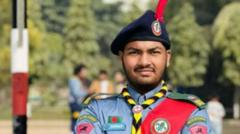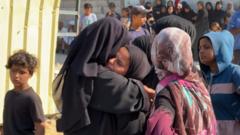In Washington DC, two Israeli embassy staff members were fatally shot outside a Jewish museum by a suspect who allegedly shouted pro-Palestine slogans. Witnesses recount the chaos following the attack, with investigations now focusing on potential hate crime motivations tied to rising antisemitism.
Tragic Shooting of Israeli Embassy Staff in Washington DC Raises Concerns over Antisemitism

Tragic Shooting of Israeli Embassy Staff in Washington DC Raises Concerns over Antisemitism
A shooting outside the Capital Jewish Museum claims the lives of two Israeli embassy employees, sparking a wave of condemnation and highlighting issues of bias and violence.
A tragic shooting outside the Capital Jewish Museum in Washington DC has resulted in the deaths of two Israeli embassy staff members, prompting widespread outcry and discussions about rising antisemitism in the U.S. The victims, identified as Yaron Lischinsky and Sarah Lynn Milgrim, were shot while leaving a cultural event held at the museum. Witnesses described chaos as shots rang out shortly after 9 PM local time, with emergency responders finding the couple unconscious at the scene.
The assailant, Elias Rodriguez, a 30-year-old from Chicago, has since been arrested. Law enforcement officials noted that Rodriguez was seen pacing near the museum before he opened fire with a handgun. During the incident, he reportedly chanted, "free, free Palestine." An ongoing investigation is being led by the Metropolitan Police Department, with assistance from the FBI to determine if the incident may be classified as a hate crime or linked to terrorism.
The victims were deeply admired within the embassy community; they were described as a loving couple on the brink of getting engaged. Yechiel Leiter, the Israeli ambassador to the U.S., expressed the embassy's profound grief, stating that Lischinsky had recently purchased an engagement ring in preparation for a proposal to Milgrim.
Eyewitness accounts reveal how the shooter blended in with other attendees before revealing his identity. One witness mistakenly thought he needed assistance before realizing he was the perpetrator. The event itself, organized by the American Jewish Committee, aimed to connect young Jewish professionals and diplomats, with discussions centered around humanitarian efforts in the Middle East.
The tragic incident has drawn responses from high-profile political figures, including former President Donald Trump, who condemned the attack as antisemitic, and Israeli Prime Minister Benjamin Netanyahu, who voiced outrage at what he deemed an abhorrent act of violence. Netanyahu directed increased security measures at Israeli diplomatic missions worldwide, emphasizing the urgency of combating antisemitism.
As tensions escalate globally around the Israel-Palestine conflict, the shooting has reignited discussions about the proliferation of hate and violence against specific communities. The embassy community and the broader public continue to seek answers and justice in the wake of this harrowing event, marking a somber moment in both local and international contexts.






















